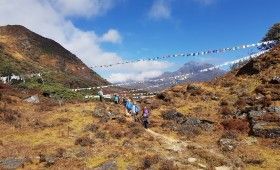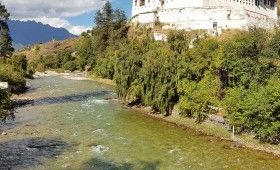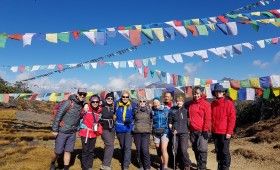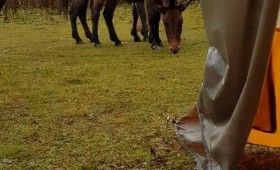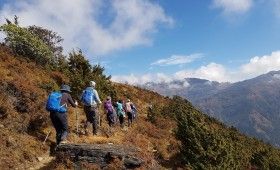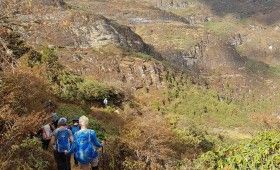- Challenges
Challenges
Get ready to achieve something incredible! Browse over 70 challenges across 4 continents to find your challenge of a lifetime.
- Charities
Charities
Join the specialists in worldwide charity trekking and cycling challenges to provide your supporters with the fundraising adventure of a lifetime!
- Groups
Groups
From one day challenges, week long trips or full expeditions, explore the fundraising and team building events we can offer your organisation, school or private adventure!
- Preparation
Preparation
Now you've booked, check out our suggestions to get ready to take on your challenge!
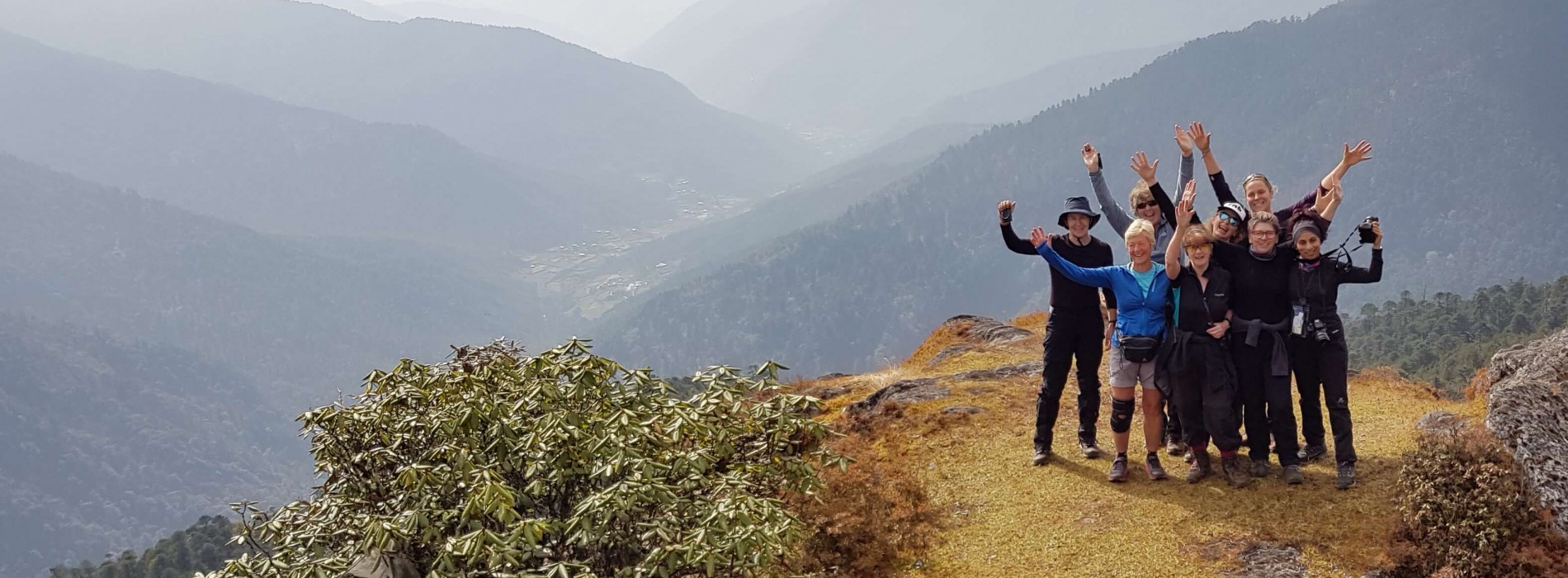
Trek Bhutan 11 days • Bhutan
About the Challenge
The small Buddhist Kingdom of Bhutan, Land of the Thunder Dragon, lies in the soaring peaks and forested valleys of the eastern Himalayas. Isolated from the world for centuries, it is famously protective of its traditional, sacred heritage. Access to most of the country is restricted, though any trekker making the effort to travel to this remote mountainous region will receive a warm welcome.
Our trek follows the classic Druk Path between Paro and Thimpu, taking in dense forest, yak pastures and clear mountain lakes as we trek from the valley floor up to mountain ridges and over high passes – all with an unforgettable backdrop of snow-capped Himalayan peaks. Our highest point is 4210m, and we build in acclimatisation early on, to help our bodies cope with the altitude.
The cultural discovery, rewarding trekking and magnificent landscapes make a winning and unforgettable combination: this is a trekking experience to treasure.
Dates & Prices
Tracy - June 2019
Fabulous overall experience. Bhutan is an amazing country and our adventure was made more enjoyable because of the fantastic ground crew and staff. Highly recommended!
Itinerary
WHAT'S INCLUDED
- All transport from London to Paro return
- All meals except where specified, accommodation and camping equipment
- Discover Adventure leaders; doctor with a group of 15 or more participants; local guides and drivers
- Local support and back-up equipment
- Visits and permits required for Bhutan
- Entry to any other sites included in itinerary
WHAT'S EXCLUDED
- Any meals specified 'not included' in the itinerary
- Travel insurance
- Personal spending money, souvenirs and drinks
- Sleeping bag and sleeping mat
- Tips for local guides and support crew
- Inbound airport departure tax (no tax applied at time of writing)
- Entry visa for Nepal
- Fees for any optional sites, attractions or activities
- Airline taxes: we cap these so £250.00 is the maximum you will pay
- Any applicable surcharges as per Terms and Conditions
Challenge Information
On the Trip
- Leaders & Trip Support
Your trip will be led by experienced Discover Adventure leaders. Our leaders are selected for their experience in harsh wilderness environments, knowledge of travel in remote areas, friendliness and approachability, sense of humour and ability to safely and effectively deal with any situation that arises. They are also trained in expedition first aid. You are in very safe hands with a Discover Adventure leader. Usually leaders are based in the UK or other English-speaking countries and lead for us regularly throughout the year in many different countries. In some instances, trips are led by in-country guides with a wealth of knowledge about the region; they have been trained by us to provide the level of support expected on a Discover Adventure trip.
- Local Support Crew
Our local support crew is made up of local guides, assisted by drivers, porters, cooks and other support staff, depending on the type of trip. Local guides know the area well, and are a great source of knowledge about local customs and lifestyles. Not all support crew will speak English well, but are very friendly and approachable. The Discover Adventure crew work closely with the local crew to ensure your trip runs smoothly and safely.
Your leader will arrange a collection of tips for the local support crew at the end of your trek, and you will be provided with a guideline amount in advance. Tipping is not obligatory, but once you see how hard they work on your behalf you will be happy to donate something! All our local crew are paid wages, but bear in mind that the average wage in many countries may be less than you would spend on an average night out.
- Trip Safety
Your safety, and that of the rest of the group, is our highest priority. Our trips are designed and planned with safety in mind. Your crew will be equipped with communication devices (eg phones, radios and/or emergency satellite phones), medical kit and other safety apparatus appropriate to the destination. Our leaders always have access to our 24-hour emergency UK back-up. They are responsible for safety on the trip, and will make any changes to the itinerary they deem necessary, should local conditions dictate. Pre-trip administration - such as medical questionnaires and travel insurance as appropriate - is all done with your safety in mind.
- Flight Information
Group flights usually leave from London Heathrow or Gatwick on scheduled airlines and are booked through Discover Adventure Ltd under ATOL licence 5636. By travelling with Discover Adventure you are protected by the Civil Aviation Authority (CAA).
Your journey may involve a transit en route; details of route and flight times will be confirmed several months before departure. We do not always use the same airline for each destination; if you wish to know the probable carrier and flight times, please call for details. You will usually receive confirmed flight details several months before departure. Our itineraries are always based on current flight schedules and are therefore subject to change by the airline. If you prefer to book your own flights please ask us for a land-only cost.
- Accommodation
We camp in two-man tents; these are usually expedition-style (ie sleeping room only). Camps are usually simple, in remote locations with great views! We have communal dining areas (usually with tables and chairs/stools) and toilet tents, and the local crew look after us very well. We stay in hotels (of a 2-3* standard or equivalent) at the start and end of the trip; standards may vary between different hotels, but they are generally clean and comfortable with good facilities.
- Roomshare Arrangements Our trips are sold on a shared accommodation basis. Some nights are usually twin-share. On some nights we are likely to sleep in more communal rooms such as dormitories, huts, local homestays, etc., depending on the trip, and you may be sharing with a larger number of participants or the whole group; this type of accommodation cannot always be single-sex.
You can tell us if you are travelling with someone else on the trip when you book or within your passenger portal, and we will do all we can to accommodate this request. It is important that each person completes the room share request on their bookings. For customers booking and travelling together, including same-sex couples, a double bed can be requested if available.
If you're not familiar with anyone in the group, rest assured, we always pair you with someone of the same gender (as per the information you provided when booking, or passport markers), and a similar age where possible. We're actively working to improve our system's gender restrictions to be more inclusive, and we've recently made significant strides in this area. If you identify differently from the gender marker on your passport and would like to discuss this before booking, please feel free to reach out to us. - Food & Dietary Requirements
The food provided is plentiful, often local in style and freshly-cooked, and will give you plenty of energy. Sometimes we enjoy a buffet-style lunch-stop, other times we might have packed lunches. On some trips we stop at small local restaurants. Dinners are generally eaten at our accommodation each evening. In some regions there may be less variety than you are used to, and in others fresh meat or produce can be harder to come by. Any meals not included are listed in the itinerary and are generally on travel / free days, giving you the opportunity to explore and try other culinary experiences! There is always something to suit different budgets.
Being vegetarian or having other dietary requirements is not usually a problem provided you let us know well in advance. Please do not expect as much variety as you would have access to at home – we may be in very rural or remote areas, or among people of a different culture who may not understand your requirements, however willing they are to help. If you know there are plenty of foods you cannot eat we strongly recommend you bring extra snacks from home so you can top up your energy supply. Please feel free to ask us for advice.
- Luggage
Your luggage, food, water and equipment is transported for you from one night-stop to the next. If there is easy road access this is done by vehicle; if not porters, mules or even camels might carry your bags, depending on the terrain.
Space is limited and hard-sided luggage is not suitable, so it is essential that your kit is packed in a soft bag, rucksack or expedition kitbag. Ask us about our specially-designed low-cost kitbags if you don’t have one already. You should also bring a small daypack to carry for items needed during the day as you will not have access to your main luggage until the evening.
Preparing for the Challenge
- Challenge Grading
GRADE | RED
All our trips are designed to provide a challenge. Trips are graded Yellow, Orange or Red, in increasing level of challenge. This trip lies within the RED range.
The grade is determined by factors such as terrain, distance, climate, altitude, etc. Each colour grade has a spectrum which reflects the difficulty of these factors. Trip duration, accommodation and living conditions are also taken into account. Some sections will feel more challenging than others, but the grade reflects the overall trip. Unusual weather conditions can also have a significant impact.
The Accommodation icon indicates the living conditions while trekking/cycling. While there are usually several factors that present a challenge, the Challenge icon indicates the trip's most challenging element, for most people.
- Clothing & Kit
We plan our trips around the optimal weather conditions, but could still be exposed to bad weather at any time. It is vital you are prepared for all conditions. We provide you with a detailed packing kit-list on registration, with plenty of information, and we are always available if you need advice.
- Passport & Visa / Vaccinations
Entry requirements vary depending on your destination and nationality. It is your responsibility to ensure your passport is valid, and any visas are obtained in good time. Check the FCO’s advice on entry requirements for your destination to be sure. Please ensure you allow plenty of time to apply for your visa; we will provide you will all necessary information 6 weeks prior to depature to assist with your application.
Your routine UK schedule of vaccinations should be up-to-date (especially tetanus). We recommend you check Fit For Travel for further details. You should always check with a GP or travel clinic for up-to-date travel health advice as it does change.
- Travel Insurance
Travel Insurance is compulsory on all of our challenges outside of the UK; we strongly suggest that you arrange insurance cover as soon as your booking with us is confirmed, or as soon as you're able to purchase some, and at least 8 months prior to travel. Should you need to cancel prior to departure, you will need insurance to cover the costs involved (registration fee and any trip costs depending on cancellation date).
We all hope never to need it, and thankfully most of the time we don't, but on those rare occasions when you do, you want it to cover you as best it can. Whilst it's a fairly boring admin task relating to your trip of a lifetime, it is really important you ensure that you have adequate cover for the type of challenge you are taking part in as well as medical emergencies, evacuation and repatriation, so make sure you're happy with the level of cover. There are lots of suppliers out there, with a wide range in levels of cover; generally speaking, you get what you pay for! Get and pay for the right level of cover and then you can go on your adventure not having to worry about the what-if's. For more details click here.
Once your travel insurance is arranged, just remember to let us know the policy number and 24-hr medical emergency phone number provided by your insurers.
- Cancelling your booking
In the unfortunate circumstance that you need to cancel your booking, we would ask that you notify us in writing either by email or post. Your cancellation will be considered effective from the date the notice is received. Registration, administration and amendment fees are non refundable and, depending on your payment option and how close it is to your challenge departure date, you may be liable for a cancellation charge.
Full details of all cancellation charges may be found in the Terms and Conditions of booking.
- Group Size
Your booking is part of a group challenge, and the tour costs and fundraising targets listed on our website are based on a minimum number of participants which is shown on the challenge Our typical groups run with approximately 15-25 participants; however you may find your group is smaller or larger than this.
We will confirm at least 12 weeks prior to departure that your challenge is guaranteed to run. Occasionally it may be possible to still run the challenge with less than the minimum numbers, subject to a small group supplement. If we think a small group supplement may be necessary, we will discuss this with you as soon as possible, usually 5 months before your departure date.
Minimum numbers and groups sizes may vary on Bespoke Charity challenges. If you are booked onto a bespoke challenge please contact your charity for full details.
- Passenger Portal
We have a Passenger Portal which will give you more details of the challenge itself. It also enables you to see any outstanding information we need, the countdown to your challenge departure, see your outstanding balance, make payments and update your contact details. You can access this via the following link - Passenger Portal Log in.
The DA Ethos
- Cultural Differences
For most people, the main attraction of travelling to a different country is to see new sights and enjoy new experiences. Sometimes those new experiences can make life harder or more inconvenient than you may like, such as toilet hygiene or different food, or simply a different attitude to solving problems. This is all part of the challenge you are signing up for! We are very privileged to live in a country with a high standard of living, and travelling exposes us to different challenges – all of which help broaden our horizons. We can guarantee that coming face-to-face with experiences outside your normal ‘comfort zone’ will help you bond with your fellow participants and provide you with plenty of things to laugh about! A sense of humour and sense of adventure are two of the most important things to bring with you!



